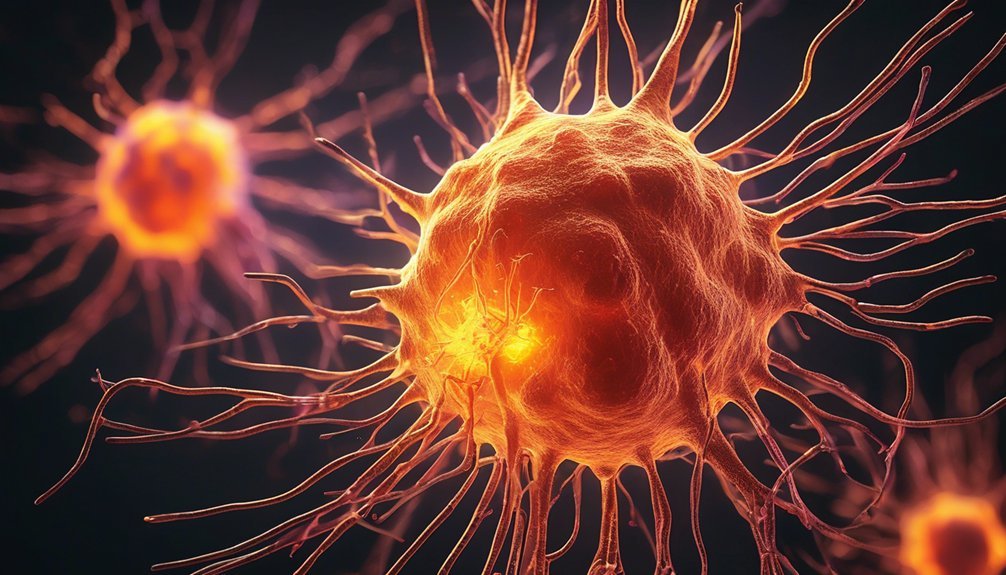In a world where cancer treatment constantly seeks innovative approaches, the keto diet emerges as a compelling contender in the realm of cancer metabolism. Have you ever wondered how a dietary shift towards high fat and low carbs could potentially influence cancer cells? The studies on the keto diet and cancer delve into intriguing findings that suggest its impact goes beyond mere nutrition. Discover the evolving landscape where metabolic strategies intertwine with cancer therapy, offering a glimpse into a promising avenue that may reshape future treatment paradigms.
Key Takeaways
- Keto diet alters cancer cell metabolism.
- Reduction in glucose levels may slow tumor growth.
- Improved chemotherapy effectiveness with keto diet.
- Enhanced immune response seen in cancer treatment.
- Studies show positive outcomes in cancer patients.
Understanding the Ketogenic Diet
Understanding the Ketogenic Diet involves grasping the fundamental principles of this high-fat, low-carb eating approach. The diet is designed to shift your body into a state of ketosis, where it primarily burns fat for energy instead of carbohydrates. By significantly reducing carb intake and increasing fat consumption, your body starts producing ketones, which are used as an alternative fuel source.
The Ketogenic Diet offers various nutritional benefits, such as improved blood sugar control, enhanced weight loss, and increased mental clarity. Following the dietary guidelines involves consuming high amounts of healthy fats like avocados, nuts, and olive oil, moderate protein from sources like fish and poultry, and minimal carbohydrates mainly from non-starchy vegetables.
It's essential to monitor your macros carefully to ensure you're within the recommended ranges for each nutrient category. Adhering to these guidelines can help optimize the effectiveness of the Ketogenic Diet in achieving your health and wellness goals.
Cancer Metabolism Overview
Cancer metabolism is a complex interplay of cellular processes that contribute to the growth and survival of cancer cells. Metabolic shifts in tumor metabolism play a crucial role in sustaining the rapid proliferation of cancer cells. Unlike normal cells, cancer cells exhibit altered metabolic pathways that allow them to adapt to the unique demands of uncontrolled growth and division.
Tumor metabolism involves reprogramming cellular processes to meet the energy and biosynthetic requirements of cancer cells. One hallmark of tumor metabolism is the increased utilization of glucose through aerobic glycolysis, known as the Warburg effect. This shift in energy production enables cancer cells to generate ATP and essential biomolecules rapidly.
Additionally, cancer cells often exhibit increased glutamine metabolism to support cell growth and proliferation. Glutamine serves as a crucial nutrient for cancer cells, providing carbon and nitrogen for various biosynthetic pathways. Understanding these metabolic adaptations in tumor cells is essential for developing targeted therapies that exploit the vulnerabilities of cancer metabolism.
Impact on Tumor Growth

A key factor influencing tumor growth is the intricate interplay between cancer cells and their surrounding microenvironment. Tumor progression is heavily influenced by metabolic changes within these cells. Research suggests that the ketogenic diet, with its low carbohydrate and high fat intake, may impact tumor growth by altering the metabolic environment in the body.
Studies have shown that cancer cells heavily rely on glucose for energy production, a process known as aerobic glycolysis. By restricting carbohydrates, the ketogenic diet aims to lower blood glucose levels, potentially starving cancer cells of their primary fuel source.
Furthermore, the shift to ketone bodies as an alternative energy substrate may selectively affect cancer cells, which typically have metabolic inflexibility compared to normal cells.
These metabolic changes induced by the ketogenic diet could potentially slow down tumor progression and reduce the aggressiveness of certain cancers. Further research is needed to fully understand the mechanisms behind how the keto diet influences tumor growth and whether it can be effectively integrated into cancer treatment protocols.
Ketogenic Diet and Inflammation
The relationship between the ketogenic diet and inflammation is a topic of growing interest in the field of nutrition and health. Studies suggest that the ketogenic diet may play a role in reducing inflammation within the body. Inflammation is a natural part of the body's immune response, but chronic inflammation can lead to various health issues, including cancer. The ketogenic diet's ability to reduce inflammation is thought to be linked to its impact on the cellular response within the body.
Research indicates that the ketogenic diet may help in reducing inflammation by altering the way cells function and communicate.
Role in Chemotherapy Effectiveness

When considering the ketogenic diet's impact on cancer treatment, it is essential to explore its role in chemotherapy effectiveness. The synergy between the ketogenic diet and chemotherapy has been a topic of interest due to its potential to enhance treatment outcomes. Studies suggest that combining the ketogenic diet with chemotherapy may lead to improved therapeutic effects against certain types of cancer.
| Ketogenic Diet and Chemotherapy Synergy |
|---|
| Enhanced Cancer Cell Sensitivity |
| Reduced Chemotherapy Side Effects |
| Improved Treatment Efficacy |
| Potential for Lower Chemotherapy Doses |
| Better Overall Treatment Outcomes |
Ketosis and Cancer Cells
Cancer cells exhibit a unique response to the state of ketosis, a metabolic condition characterized by elevated levels of ketone bodies in the bloodstream. When the body is in ketosis, it relies on fat for energy instead of carbohydrates, leading to metabolic changes that can impact cancer cells. Research suggests that some cancer cells rely heavily on glucose for energy, and when glucose availability is limited due to the ketogenic diet, these cancer cells may struggle to thrive.
This shift in metabolism could potentially slow down cancer progression in some cases. Additionally, ketosis may also decrease inflammation, another factor that can contribute to cancer development and progression. While more research is needed to fully understand the relationship between ketosis and cancer cells, initial studies show promising results in terms of how metabolic changes induced by the ketogenic diet could affect cancer progression.
Potential Side Effects

As you explore the potential benefits of the ketogenic diet in relation to cancer cells, it's essential to also consider the potential side effects that may arise from adopting this dietary approach. While the keto diet has shown promise in some cancer research, there are potential long-term effects to be aware of.
One concern is the impact on cholesterol levels, as the high-fat nature of the diet can lead to increased LDL cholesterol in some individuals. Additionally, the restrictive nature of the diet may require significant dietary adjustments, potentially leading to nutrient deficiencies if not carefully monitored.
It's important to work closely with a healthcare provider or a dietitian when following a ketogenic diet, particularly for those with existing health conditions. Monitoring for any adverse effects and making necessary dietary adjustments are crucial to mitigate potential risks associated with the long-term adoption of the keto diet.
Clinical Trial Findings
An analysis of recent clinical trial findings reveals compelling evidence supporting the potential efficacy of the ketogenic diet in influencing cancer cell metabolism. Patient outcomes from these trials have shown promising results, indicating that the ketogenic diet may have a positive impact on cancer treatment. Research implications suggest that further investigation into the relationship between the keto diet and cancer is warranted. Here are some key points to consider:
- Improved Tumor Response: Some trials have reported enhanced tumor response rates in patients following a ketogenic diet.
- Enhanced Quality of Life: Patients undergoing cancer treatment while on a ketogenic diet have experienced improved quality of life compared to those on a standard diet.
- Metabolic Changes: Studies have shown significant metabolic changes in cancer cells when subjected to a ketogenic diet.
- Promising Survival Rates: Initial data from clinical trials indicate potentially improved survival rates among cancer patients utilizing a ketogenic diet.
These findings underscore the importance of ongoing research in exploring the benefits of the ketogenic diet for cancer patients.
Ketogenic Diet and Immunotherapy

Exploring the intersection of the ketogenic diet with immunotherapy opens up a new realm of potential synergies in cancer treatment strategies. By combining the metabolic benefits of a keto diet with the immunomodulatory effects of immunotherapy, researchers aim to enhance immune responses and improve treatment outcomes for cancer patients.
| Potential Benefits of Ketogenic Diet and Immunotherapy | Description | Evidence |
|---|---|---|
| Enhanced Immune Response | Ketogenic diet may help reduce inflammation and improve immune function, potentially enhancing the body's ability to fight cancer cells. | Studies suggest that a keto diet can positively impact immune cell activity and response. |
| Improved Treatment Outcomes | Combining a keto diet with immunotherapy could lead to better treatment responses and increased survival rates for cancer patients. | Preliminary research indicates promising results in terms of treatment efficacy and patient outcomes. |
| Synergistic Effects | The combined approach may create synergies that maximize the benefits of both treatments, offering a more comprehensive strategy against cancer. | Clinical trials exploring the synergy between keto diet and immunotherapy are ongoing. |
Patient Experiences and Testimonials
Several individuals undergoing cancer treatment have shared their firsthand experiences with incorporating a ketogenic diet alongside immunotherapy. Survivor stories and patient perspectives highlight the potential benefits and challenges of this approach:
- Improved Quality of Life: Many patients reported feeling more energetic and experiencing reduced fatigue while following a ketogenic diet during their cancer treatment.
- Enhanced Treatment Tolerance: Some survivors mentioned that they were better able to tolerate the side effects of immunotherapy when they followed a ketogenic diet.
- Weight Management: Patient testimonials often mention successful weight management during their cancer journey through the implementation of a ketogenic diet.
- Emotional Well-being: A number of individuals expressed feeling empowered and more in control of their health by adopting a ketogenic diet, positively impacting their emotional well-being during treatment.
These survivor stories and patient perspectives provide valuable insights into the potential impact of a ketogenic diet on cancer treatment outcomes.
Recommendations for Cancer Patients

When navigating cancer treatment, it's crucial for patients to consider personalized dietary recommendations that align with their individual health needs and treatment plans. Nutritional guidance plays a vital role in supporting cancer patients throughout their journey. It's essential to consult with healthcare professionals, such as oncology dietitians, who can provide tailored advice based on specific treatment protocols, side effects, and overall health status. These experts can help cancer patients optimize their nutrition to enhance treatment outcomes and improve quality of life.
In addition to individualized nutritional guidance, cancer patients can benefit from various support resources. Support groups, online forums, and counseling services offer emotional support, practical tips, and a sense of community during challenging times. These resources can empower patients to make informed decisions about their dietary choices, navigate potential food-related issues, and stay motivated on their path to wellness.
Future Research Directions
As you look ahead to the landscape of cancer research, an area of significant interest lies in exploring the potential impact of the ketogenic diet on cancer treatment outcomes. Understanding the role of dietary interventions, particularly the ketogenic diet, can pave the way for personalized therapies that target cancer cells while supporting overall health and well-being.
Future research directions in the realm of keto diet and cancer may include:
- Long-term Effects: Investigating the sustained impact of ketogenic diets on cancer progression and patient survival rates.
- Combination Therapies: Exploring the synergistic effects of combining ketogenic diets with traditional cancer treatments like chemotherapy or radiation.
- Biomarker Identification: Identifying specific biomarkers that can predict individual responses to ketogenic diets for more personalized therapy approaches.
- Clinical Trials: Conducting large-scale clinical trials to further validate the efficacy and safety of ketogenic diets as an adjunct to cancer treatment modalities.
These avenues of research hold promise for advancing our understanding of how dietary interventions, specifically the ketogenic diet, can be integrated into personalized cancer therapies for improved patient outcomes.
Frequently Asked Questions
Can the Ketogenic Diet Cure Cancer?
While the ketogenic diet isn't a proven cure for cancer, some studies suggest it may have treatment effectiveness in certain cases. However, the long-term effects and overall impact on cancer are still being researched. It's important to consult with healthcare professionals before considering the keto diet as a primary cancer treatment.
Is the Ketogenic Diet Safe for All Cancer Types?
When considering the safety of the ketogenic diet for all cancer types, it's crucial to weigh the potential risks and long-term outcomes. By maintaining a balanced approach and consulting with healthcare professionals, you can navigate the complexities of this dietary choice.
Remember to prioritize your well-being and seek evidence-based information to make informed decisions about your health journey. Your diligence and commitment will guide you towards the best course of action for your unique situation.
How Does the Ketogenic Diet Affect Energy Levels in Cancer Patients?
The ketogenic diet can lead to metabolic changes that affect energy levels in cancer patients. By shifting the body's primary energy source from glucose to ketones, some patients report increased energy levels while others may experience fatigue during initial adaptation phases. Understanding these metabolic shifts is crucial for assessing clinical outcomes and tailoring dietary interventions to optimize energy levels and overall well-being in cancer patients following a ketogenic diet.
Are There Specific Foods to Avoid on a Ketogenic Diet for Cancer?
To maintain nutritional balance on a ketogenic diet for cancer, you should be cautious of certain foods. Potential risks associated with this diet include inadequate nutrient intake and digestive issues.
Focus on avoiding processed foods high in sugar and unhealthy fats. Opt for whole, nutrient-dense foods like leafy greens, nuts, seeds, and lean proteins.
Prioritize quality over quantity to support your overall health and well-being.
Can the Ketogenic Diet Prevent Cancer Recurrence?
To prevent cancer recurrence, consider preventive measures like following dietary guidelines.
The ketogenic diet has shown promise in some studies for its potential benefits in cancer treatment and prevention. By focusing on low-carb, high-fat foods, you may support your overall health and potentially reduce the risk of cancer recurrence.
Always consult with a healthcare professional before making significant dietary changes, especially in relation to cancer treatment or prevention.
Conclusion
So, you may be wondering, "Is the ketogenic diet truly effective in combating cancer?" While ongoing research is promising, some may question the sustainability of such a restrictive diet. However, with growing evidence of its impact on cancer metabolism, the keto diet presents a compelling option for cancer patients seeking alternative treatment strategies. By carefully monitoring nutritional needs and working closely with healthcare professionals, individuals can harness the potential benefits of the ketogenic diet in their fight against cancer.





